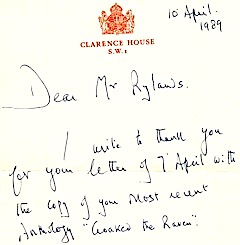From the papers of the Cambridge don Dadie Rylands - a courteous letter thanking him for the gift of his latest slim anthology Croaked the Raven. Written by the Queen Mother's private secretary Sir Martin Gilliat.
Clarence House 10 April 1989
Dear Mr Rylands
I write to thank you for your letter of 7 April with the copy of your most recent anthology 'Croaked the Raven.' When some five years ago you sent her 'Quoth the Raven'- so superbly presented by James Stourton - Queen Elizabeth the Queen Mother was entranced by it and I have frequently seen Her Majesty dipping into it in the intervening years.
Your latest creation has been received with much pleasure and I am to offer you her Majesty's very sincere thanks.
As time allowed both Ruth Fermoy, who is here at present, and I skimmed through it before I laid it before the Queen Mother and were absolutely charmed.
I am sad James was too heavily committed this time – we are dining together next week and I will rebuke him! Yours sincerely Martin Gilliat.
Two footnotes from web:
From girlhood to extreme old age Queen Elizabeth was noted for the sunniness of her disposition, for her extraordinary ability to smile her way through grief and misery, through death, disease and disruption. As a young woman, she was generally judged 'a sweet little thing', though she had her critics. Cecil Beaton described her as 'a marshmallow made on a welding machine', and Stephen Tennant, eccentric but no fool, wrote of her, 'She looked everything she was not: gentle, gullible… [but] behind this veil… hard as nails'.
Her notorious 'ostrich' attitude enabled her to ignore anything that might otherwise have distressed her or impinged on her comfort, sublimely indifferent to the feelings of others. Sir Martin Gilliat, her Private Secretary for nearly 40 years, was deeply embittered by his employer's failure to visit him during his final illness. And her own daughter, Princess Margaret, wretchedly unhappy over the Townsend affair, was reduced to throwing a book at her mother's head so frustrated was she by her parent's refusal even to discuss the situation.
Lieutenant-Colonel Sir Martin Gilliat (1913-1993). In May 1940 he was captured by the Germans with the rest of his battalion in Calais and after twice slipping away from the column being marched into captivity was each time recaptured. During the five years of imprisonment Gilliat made several further attempts to escape, twice being at large for some days before being recaptured when within walking distance of freedom. As 'a persistent escaper' he was then sent to Colditz, where he played a large part in maintaining the morale of his fellow-prisoners and was elected as their Adjutant. For his services in the war he was mentioned in despatches and appointed MBE. His experiences as a POW remained vividly in his memory, though he was always reluctant to speak of them.
On his return he rejoined his regiment and, after a short spell in the Mediterranean, he was appointed successively Deputy Military Secretary to the Viceroy of India, Lord Mountbatten, and Comptroller to Malcolm Macdonald, High Commissioner for South-East Asia. While in Delhi, he was shot and wounded in the neck and his Sikh driver was killed in an ambush. In 1953 he became Military Secretary to the Governor-General of Australia, Field Marshal Sir William (later Viscount) Slim. His friendliness and approachability won him many Australian friends. The successful discharge of his duties in all these appointments made him an obvious choice to succeed Oliver Dawnay as Private Secretary to Queen Elizabeth the Queen Mother in 1956, an appointment which he was to hold for the next 37 years.

